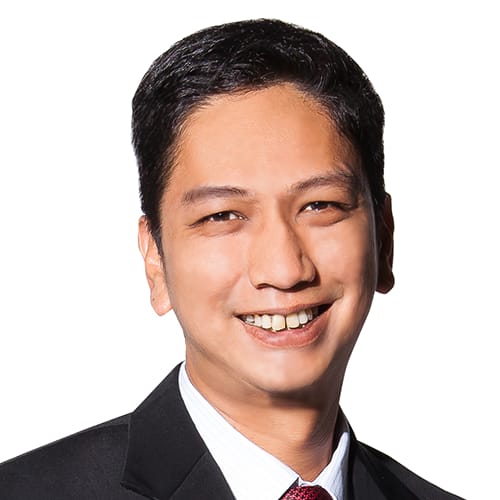Indonesia Elections 2024: Young voters want more than promises and social media campaigns from next president
Indonesians aged under 40 make up the majority of the country’s voters. All three presidential candidates have been wooing them but analysts say winning this crucial demographic over may take more than promises and online branding.
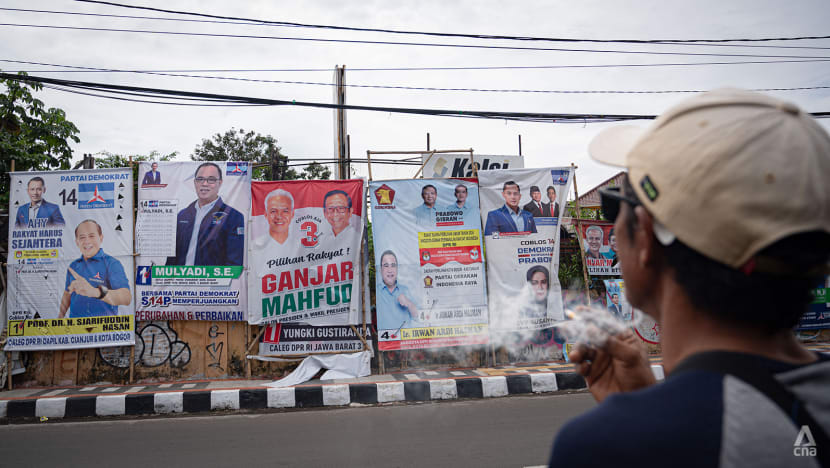

This audio is generated by an AI tool.
JAKARTA: Months away from completing a bachelor's degree in information technology, Mr Bobby Hidayat is torn.
The 22-year-old is happy that he will no longer be a burden to his single mother who had to work tirelessly to put him through school. But at the same time, Mr Bobby is anxious about life after graduation.
What awaits him is a shrinking job market as investment in the Indonesian technology scene slumped in the aftermath of a global economic slowdown brought on by the COVID-19 pandemic and the political uncertainty caused by the upcoming election.
According to the Jakarta Globe, investments in the country’s digital sector amounted to around US$9.5 billion in 2021. Two years later, the figure plummeted to less than US$1.9 billion.
Dozens of companies, including some of the biggest names in Indonesia’s technology sector, such as multi-sector super-app GoTo, payment gateway Xendit and investment platform Ajaib, have been downsizing their workforce.
During many restless nights, Mr Bobby has wondered what opportunities are out there for an inexperienced soon-to-be-graduate of a mid-tier university in Jakarta.
What is certain, he said, is that he wants a president who can create more jobs and ensure that Indonesia remains attractive to investments. He also wants someone who can do something about the rising cost of living, home ownership and college tuition fees.
“I want a leader who understands the problems we youths are facing,” Mr Bobby told CNA, adding that he is still unsure who to vote for in the upcoming Indonesian presidential election on Feb 14.
Other 20-year-olds interviewed by CNA are equally undecided, highlighting a diverse list of criteria that might help them choose the right candidate.
“The most important issue for me is women’s rights and gender equality,” 24-year-old Mirna Agustina told CNA.
Meanwhile, 27-year-old Mr Adrian Putra said the most important issue for him is the supremacy of the law.
“I want someone who can make sure that the rich and powerful can't get away with breaking the law,” he said, adding that he also wants to see a reform in law enforcement agencies and institutions.
Indonesia’s youths are also scrutinising the candidates’ commitments to issues such as climate change, inclusivity and anti-corruption.
The election will see three candidates vying to become the next president of Southeast Asia’s biggest economy: former Jakarta governor Anies Baswedan, defence minister Prabowo Subianto and former Central Java governor Ganjar Pranowo.
The outgoing president, Joko Widodo, who has a high approval rating of 80 per cent, is barred by the country’s constitution from seeking a third term.
.png?itok=BfZUGr49)
A candidate needs to secure more than 50 per cent of the national votes and 20 per cent of the votes in at least 19 of Indonesia’s 38 provinces to win the presidential election.
Which is why analysts say the ability to win the hearts and minds of young voters is crucial.
According to the General Elections Commission (KPU), there are 106 million Indonesians aged between 17 and 40, representing 52 per cent of the total numbers of eligible voters in the country.
With so many votes up for grabs, all three candidates have been trying to woo this age group, from promising to address issues that they might find relevant to coming up with campaign strategies and activities catering to younger voters.
Each candidate has had their own method. Mr Anies has staged online and offline events where young voters can directly ask his views on a number of different topics.
Mr Prabowo has named a youthful running mate, 36-year-old Mr Gibran Rakabuming Raka, the son of current President Joko Widodo.
Mr Ganjar has cultivated a strong social media presence by uploading his many activities on Instagram and Twitter even before he was nominated as a presidential candidate.
But youth voters themselves say this might not be enough.
NURTURING YOUNG MINDS, TARGETING YOUNG VOTES
In a 2022 study conducted by Jakarta-based think tank, Centre for Strategic and International Studies (CSIS), the 1,200 respondents aged between 17 and 40 said public welfare and job creation are two of the top issues they look for in a candidate's priorities, followed by corruption eradication and civil liberties.
But the youths surveyed are also expressing interest in issues shaping the world, including climate change and energy transition.
“Today’s young voters show a different political orientation and attitude compared to the older generations who tend to focus only on bread and butter issues like jobs and healthcare,” Arya Fernandes, the lead author of the CSIS research told CNA.
All three candidates have promised more jobs and better access to quality education as well as pledging to tackle climate change.
Mr Anies, for example, is promising to develop cities across the archipelago so they are as advanced as the Indonesian capital Jakarta, creating more job opportunities for 15 million Indonesians.
The former lecturer also promised to provide scholarships and subsidies to universities so they can lower their tuition fees to at least a third of what students are paying now.
"Anies thinks that universities are becoming too commercialised, preventing many people from pursuing a higher education,” Mr Angga Putra Fidrian, a spokesperson for Mr Anies’s campaign team, told CNA.
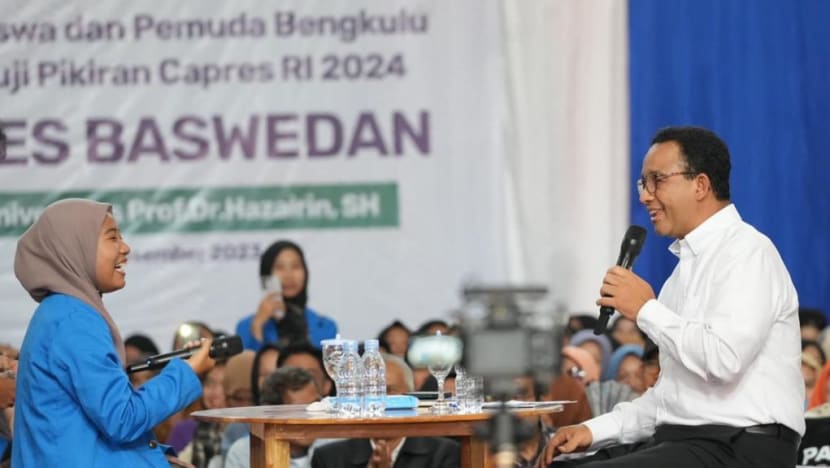
Meanwhile, Mr Prabowo is promising more jobs by having more of the country’s natural resources processed and developed into their end products at home as opposed to exporting them to another country in their raw forms.
“We will also want to improve our education system by establishing top schools and universities in every city and regency, so people don’t have to go to Jakarta to get a good education” Mr Budiman Sujatmiko, an advisor to Mr Prabowo’s campaign team, told CNA.
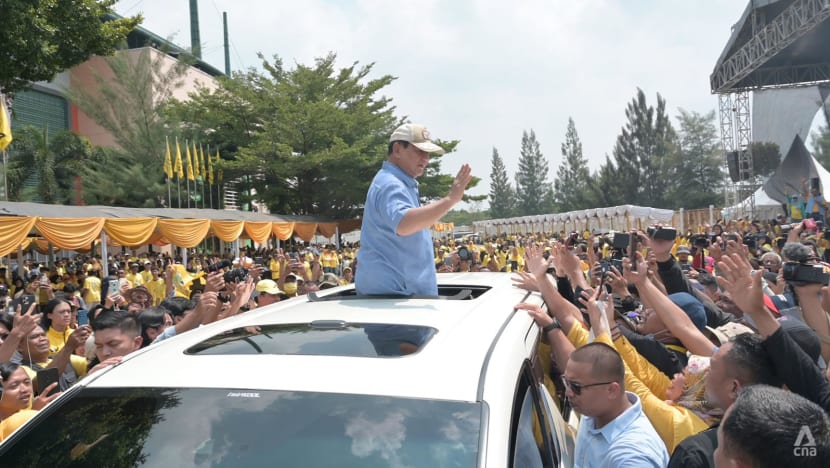
Mr Ganjar on the other hand, is promising more upskilling programmes and improving the quality of vocational schools so Indonesians can find better jobs both at home and abroad.
“Another programme is one university graduate per family,” Mr Pangeran Siahaan, a spokesperson for Mr Ganjar’s campaign team, told CNA. “By having at least one family member going to college it can not only lift the person’s own economy but also the person’s family.”
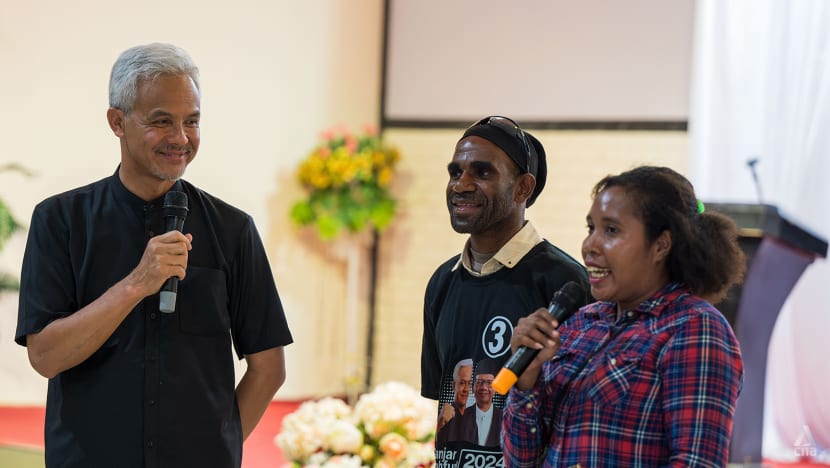
The three candidates have also demonstrated the available opportunities for young people to participate in Indonesia’s political landscape by appointing more youths in the cabinet.
Currently, there are only two cabinet members who are under 40: Minister for Youth and Sports Dito Ariotedjo, 33, and Deputy Minister for Tourism and Creative Economy, Angela Tanoesoedibjo, 36.
But 25-year-old marketing executive Maria Silaban is not convinced.
“All these programmes are great but why not do them when (the candidates) were still in power as governors or top government officials?” she said.
“I want proof not promises.”
SOCIAL MEDIA MATTERS
According to the CSIS research, 59 per cent of the respondents said that they get their information mainly from social media. Only 32 per cent said their main source of information is television. News websites and newspapers are the preferred sources of information for 6.3 per cent and 1 per cent of the respondents surveyed respectively.
Which is why all three candidates and their respective running mates have been actively sharing their activities on social media, even before the campaign season started in November.
Mr Anies has also been streaming on YouTube his event Desak Anies (Challenge Anies) where he talks about various issues such as labour rights or healthcare with youths in different Indonesian cities.
The former Jakarta governor has also been staging live TikTok sessions where viewers can ask him about anything.
“We don’t have a specific social media strategy. Everything just happened organically,” Mr Angga of Mr Anies’s campaign team said.
“Mr Anies enjoys talking to people. He envisioned that Indonesia needs a leader who listens to people’s hopes, aspirations and grievances.”
During a live TikTok session on Dec 28, viewers asked Mr Anies a host of random questions and requests from tips on how to complete one’s thesis to how to deal with failure in life.
Mr Anies’s response was praised by the 300,000 viewers who watched the livestream. His quotes were also shared many times on X, formerly known as Twitter.
Meanwhile, Mr Prabowo has been creating an online persona using artificial intelligence (AI) generated artworks, transforming the 72-year-old retired military general, known for giving fiery speeches and the numerous human rights abuse allegations pitted against him, into a child-like adorable grandpa.
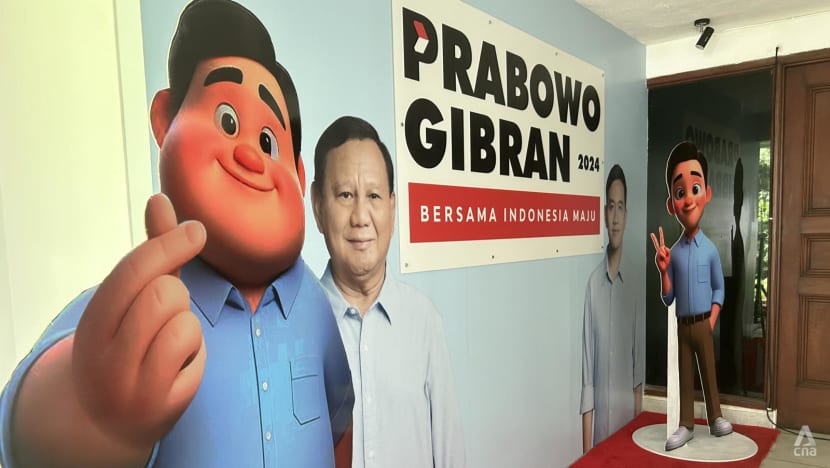
The candidate’s campaign team has also worked with celebrity YouTubers and social media influencers, granting them more access to both Mr Prabowo and Mr Gibran than journalists from mainstream media.
Mr Ganjar, on the other hand, is using social media to show that he is the man of the people, sharing not only photos of him at big campaign rallies but also of him visiting remote areas and meeting ordinary people.
He also showed his six million online followers what he does in his spare time and his many hobbies and passions which include motorcycle riding and running marathons.
Social media analyst, Mr Ismail Fahmi said the strategy deployed by Mr Anies and Mr Ganjar could resonate more with young voters.
“Mr Prabowo has been trying to paint himself as this adorable candidate but his fiery speeches and his hot-headed responses when he was attacked during the debates contradict this,” Mr Fahmi told CNA.
During the second presidential debate on Jan 7, Prabowo appeared agitated when Mr Anies criticised Indonesia’s defence budget and his performance as defence minister.
Mr Prabowo tried to interrupt during Mr Anies’s time to speak and when reprimanded by the moderators, Mr Prabowo turned to them menacingly and put his closed fists on his waist.
“The youths ... want candidates to be themselves, not to force people to believe that they are flawless or someone they’re not,” said Mr Fahmi.
OTHER FACTORS AT PLAY
Social media alone is not enough, said Hendri Satrio, a political analyst from Jakarta’s Paramadina University.
“Social media only helps to boost a candidate’s popularity and entice people to want to know more (about the candidate). But will people actually vote for someone because they like one's social media campaign? I don't think so,” he told CNA.
Mr Adrian Putra, a 27-year-old accountant living in Jakarta, echoed the sentiment.
“I will look at the candidates’ personality and track records. That to me is more important. Anyone can come up with brilliant programmes and manifestos but can they deliver?” he told CNA.
Mr Adrian said he already had some idea who to vote for in the upcoming election but his choice is not set in stone and he likes to hear what his friends and family might say.
“I try to hide the fact that I already have a candidate in mind because I want to hear their honest opinion about my candidate of choice or whether they think the other two can fare better as a leader of this country,” he said.
Ms Maria is also weighing her options by discussing them with her peers.
“Whenever I hang out with my friends, discussions about politics are inevitable now that the presidential election is around the corner,” she said.
She has closely followed the presidential and vice presidential debates, saying that they offer a glimpse into the candidates’ visions for the country.
“I also like to watch (online) discussions about the debates. I want to know what the experts feel about the candidates’ performance and their pledges,” she said, adding that she had not made up her mind about who to choose in the presidential election.
Mr Bobby said he is also discussing his options with his friends and family as well as watching the debates closely.
The university student said he is not monitoring what influencers on social media are saying, because he is aware that some of them might not be neutral.
“I tried to be rational and not pick a candidate just because my family said so or because my friends are all supporting this candidate or that candidate. I tried to get as much information as I can about each candidate and pick which one feels right for me,” he said.
“They all have their flaws. They all have their strengths and weaknesses. It’s hard and I need to decide carefully because we are all choosing who will lead this country for the next five years."
Editor’s note: The story has been amended to clarify Mr Dito Ariotedjo's position as Minister of Youth and Sports and include Angela Herliani Tanoesoedibjo's full position as Deputy Minister for Tourism and Creative Economy.








